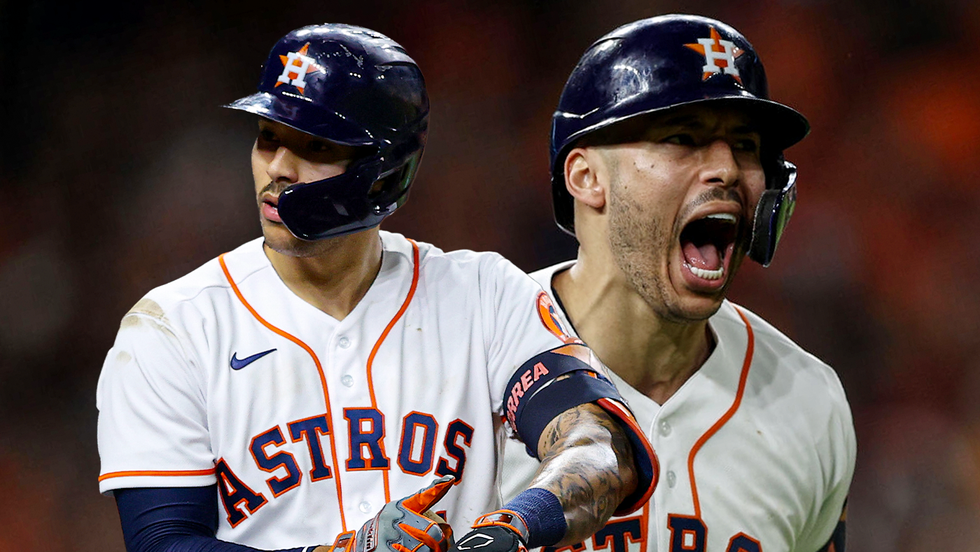Carlos Correa clears the air about Astros' last-ditch effort to re-sign him
ASTROS NEWS
23 March 2022
ASTROS NEWS

ESPN's Marly Rivera caught up with former Astros SS Carlos Correa on Wednesday and asked him about signing with the Twins and what happened with the Astros. Correa told Rivera that he has "nothing but love" for the Astros and their organization. But he also said the Astros never made him an offer post-lockout. Wow. Really, Astros?
Carlos Correa told me he has “nothing but love” for Houston and Astros front office and ownership, but also said the club did not make him any offers after the lockout. pic.twitter.com/HIBFVvBMeE
— Marly Rivera (@MarlyRiveraESPN) March 23, 2022
Apparently there was no effort made by the Astros to re-sign Correa in recent weeks, in contrast to what was heavily reported. If Correa is telling the truth, and I believe he is, then all the noise about the Astros making Correa another offer were false.
Astros have stepped up efforts to bring back Carlos Correa to the point where owner team owner Jim Crane is involved. Astros are clearly serious but other teams are still involved. @hgomez27 mentioned intensifying talks
— Jon Heyman (@JonHeyman) March 14, 2022
It certainly sounds like the reports about the Astros sending Correa a revised contract offer were bogus, and possibly coming from Correa's agent, Scott Boras. And this makes so much sense on every level. If Boras was trying to get every penny he could for Correa, using the Astros as leverage is just good business. Unfortunately, Astros fans got their hopes up for nothing.
The Astros ghosted Carlos Correa this week. James Click said he would get back to them and never did and Jim Crane did not respond at all to Scott Boras’ texts.
— John Granato (@johngranato) March 19, 2022
Plus, it makes the tweet from ESPN Houston's John Granato's look even more accurate. The Astros made their final offer before the lockout and that was that. Correa preferred the offer from Minnesota, and he took it. This also explains why Jim Crane might have been a little put off. With all these false reports floating around, Crane had to have thought they were coming from Correa's camp in an effort to get Carlos more money elsewhere.
Baseball is a business. Period.
José Soriano and two relievers combined for a two-hitter and Oswald Peraza hit his first home run since a trade from the Yankees to lead the Los Angeles Angels to a 3-0 win over the Houston Astros on Sunday.
Soriano (10-9) allowed one hit and struck out eight in seven innings. Luis García allowed one hit in a scoreless eighth and Kenley Jansen threw a perfect ninth for his 25th save.
There were two outs in the fifth when Peraza connected off Hunter Brown (10-7) into the bullpen in right-center field to put the Angels up 1-0. His homer comes after his two-run single in the ninth inning Saturday helped Los Angeles to a 4-1 victory that snapped a three-game skid.
Yoan Moncada walked to start the eighth and scored on Mike Trout’s double that bounced off the wall in center field to make it 2-0. Taylor Ward walked before Luis Rengifo reached and Trout scored on an error by Lance McCullers Jr. when the pitcher overthrew first base.
Yordan Alvarez singled with no outs in the first and Soriano walked a batter in the second and sixth innings. The Astros didn’t get another hit until Ramón Urías doubled with one out in the eighth inning. Los Angeles outfielder Taylor Ward was injured trying to make a catch on that hit when he crashed face-first into the metal scoreboard in left field.
He was carted off the field holding a towel to the right side of his face. He was taken to a hospital by ambulance where interim manager Ray Montgomery said he would receive stitches to close the cut and be evaluated.
Brown allowed three hits and a run with five strikeouts in six innings. McCullers Jr. allowed three hits and two runs in his first relief appearance since 2018.
The home run by Peraza.
It’s the fifth time the Astros have been shut out this month.
LHP Yusei Kikuchi (6-9, 3.68 ERA) will start for Los Angeles in the series finale Monday against RHP Luis Garcia, who’ll make his return after sitting out since May 2023 recovering from Tommy John surgery.
